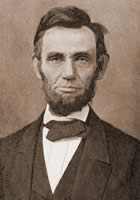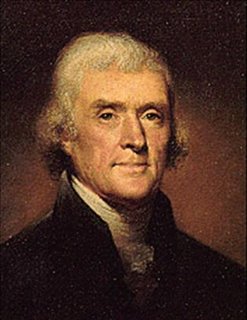Billy Joel's jaunt through the 20th century in his song "We Didn't Start the Fire", is an excellent introduction into the modern era. It is interesting to consider one man's thoughts on the important issues of his lifetime.
We'll take a closer look at the lyrics to this song, we'll analyze his thoughts on why these specific events/people are important, and then you'll have the opportunity to create your own 1990-2006 verse. (extra credit if you perform it).
For now, listen to the song, enjoy the images and consider everything that has happened in the last 60 years.
Your posting assignment is to discuss in a few paragraphs why Billy Joel chose some of the events and people he did? (describe at least 2, and I don't want any repeats.)
Monday, December 11, 2006
We Didn't Start the Fire
Friday, December 01, 2006
The Cost of Advancement
We've been discussing how Andrew Carnegie and John D. Rockefeller built great fortunes through hard work and determination. We've also considered that their fortunes came at the great expense of competitors, customers and workers.
After Reading Howard Zinn's Ch. 11 (p. 253-299) what are your thoughts on the costs of advancement and the tycoons of the late 19th century who helped to improve the nation?
Are they ruthless robber barons who only care about making a profit? Or are they great businessmen who do contribute positively on society?
Use examples of what we've read and what we've discussed to support your claim.
Tuesday, November 28, 2006
America's Unfinished Revolution
The reconstruction of the south was the period during and after the Civil War where several different groups in the government tried to solve the economic, political, and social problems that arose as a result of the Civil War. It was atime of disorder and chaos. Southern whites rejected all forms of equality and blacks wanted nothing but full freedom and land of their own. This led to frequent and inevitable riots. Reconstruction lasted from 1865 to 1877 and was one of the most controversial periods in the nation's history. People still debate its successes and failures.
What do you think? Was reconstruction a success or a failure?
Wednesday, November 15, 2006
"One Gallant Rush" - The 54th Massachusetts Regiment
 The characters from the Movie "Glory" which depicts the the 54th Massachusetts Regiment, the Civil War's first all-black volunteer company, demonstrate many qualities of leadership.
The characters from the Movie "Glory" which depicts the the 54th Massachusetts Regiment, the Civil War's first all-black volunteer company, demonstrate many qualities of leadership.
Robert Gould Shaw (Mathew Broderick), Sgt. Maj. John Rawlins (Morgan Freeman) and Private Trip (Denzel Washington) all demontrate leadership qualities in many different ways.
Discuss some events, actions or character traits where these characters showed leaderhsip.
Thursday, November 09, 2006
Lincoln Speaks Against Blacks
I will say, then, that I am not, nor ever have been, in favor of bringing about in any way the social and political equality of the white and black races; that I am not, nor ever have been, in favor of making voters or jurors of negroes, nor qualifying them to hold office, nor to intermarry with white people...
And inasmuch as they cannot so live, while they do remain together
there must be the position of superior and inferior, and I as much as any other man am in favor of having the superior position assigned to the white race.
-Abraham Lincoln, 1858
Tuesday, November 07, 2006
A New Look at the Civil War
To give you an idea of how many people that is... In 2006, the Atlanta Braves averaged 31,869/game. (ESPN.com)
Wednesday, November 01, 2006
Your thoughts on the Causes of the Civil War.
Hello class, and welcome to our new class forum. Periodically I will be giving you a discussion question and I will expect everyone to comment on the topic.
I may also give you several links so that you can do some web research to delve deeper into some of the topics we'll be discussing in class.
The purpose of the blog is to encourage you to use your critical thinking skills in addressing various questions as related to United States History. You may either contribute your own original thought or respond to someone else's posting. The only rule is that your responses must be at least one quality paragraph. Quality paragraphs should be 4-5 good, complete sentences that obviously have good thoughts included. Remember, this is a graded assignment.
In order to accurately grade your response, please post your comment with your name. (don't use your last name please)
The first discussion question is:
What do you think was the major cause of the Civil War? I know we've discussed several, try to pick one and tell me about it, even if your thesis has more than one. Use the comment link below to comment.
Monday, October 30, 2006
Alexander Hamilton...

Thomas Jefferson's long time rival Alexander Hamilton in my opinion, is one of America's more underrated 'founding fathers'. Only those that truly study history have any idea what he did for the United States. But perhaps we can start with the genius of George Washington to set the stage. There is a new book out by Dorris Kearns Goodwin, called "Team of Rivals", which talks about Abraham Lincoln's political genius of choosing his political opponents for his cabinet. Washington did something very similar. He chose the smartest men with opposing viewpoints so that both sides would be presented in the cabinet.
Hamilton and Jefferson varied in many different ways. Hamilton was a Federalist who wanted a a strong central government, a large national bank and thought that commerce and industry was the way for the US to generate revenue. For this, Hamilton was well received in the more industrialized northern colonies. Jefferson was an anti-federalist/republican who thought a large national bank would not be good for the farming/working man of the time. Jefferson distrusted central government and the rich. (did i mention that Jefferson died in debt?!)
Hamilton's financial system was put in place to get the country out of debt quickly. About 2/3 of the debt was owned by the national government, the other 1/3 by the states. The government and the states owed money to foreign nations and private citizens. Hamilton proposed that the national government would take over all of the states' debts, and then pay the foreign debts with bonds to be payed later. Because a lot of the southerners (who supported Jefferson's ideals) already started to pay off their debt, they became angry with Hamilton because had they known the national government was paying their debt they would not have made attempts to do so. This didn't bode well for Hamilton's reputation in the south.
more on Hamilton later...
Sunday, October 29, 2006
Thomas Jefferson
Was Thomas Jefferson truly an abolitionist?
He himself would you lead you to believe that he was, however, I'm of the school that believes he talked the talk, but rarely made any attempt to walk the walk. Where else in Jefferson's life did he make ANY attempt to try and end slavery? His attitude towards slavery was actually hypocritical. He would express his detestation of slavery and was always willing to support any plan to eliminate it. But he did not put forth much effort. It was a lot of wishful thinking.
Thomas Jefferson lived from the labor of slaves. And he lived well. Jefferson was in debt. (perhaps because he didn't support Alexander Hamilton's idea for a national bank, but we'll leave that for another blog.) Jefferson insisted that he would work hard to get himself out of debt, pay off his creditors and then use that to pay his debts of freedom to his own slaves. But, Jefferson never got out of debt, and he never tried very hard to do so. Throughout his life he put emphasis on drinking wine and collecting books, as opposed to getting out of debt to free his slaves. Thomas Jefferson lived very well, but not within his means. Simply go to Monticello to see this.
Additionally, Jefferson, like many liberal thinkers of the time, believed that blacks were racially inferior, and thought it impossible for blacks and whites to live in harmony side by side. Jefferson was also a supporter of extending slavery across the continent to the new lands that he purchased in the Louisiana Purchase. Hardly a man who wants to stop the abomination.
Jefferson was in no way an abolitionist.
Saturday, October 28, 2006
And so it is written...
Hello history lovers.
I hope you find this Blog entertaining, intuitive, though provoking, interesting and fun. In my never ending search for knowledge I will continuously attempt to provide interesting, noteworthy history facts on this page.
I should stop introducing and get right to it... you'll get the hang of it.
Go to www.USHistorySite.com for good ol' fashion US History Information






